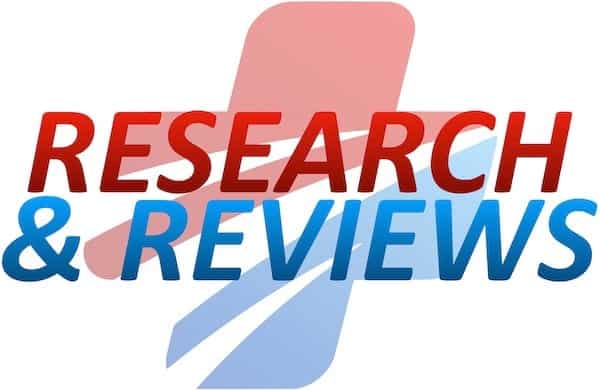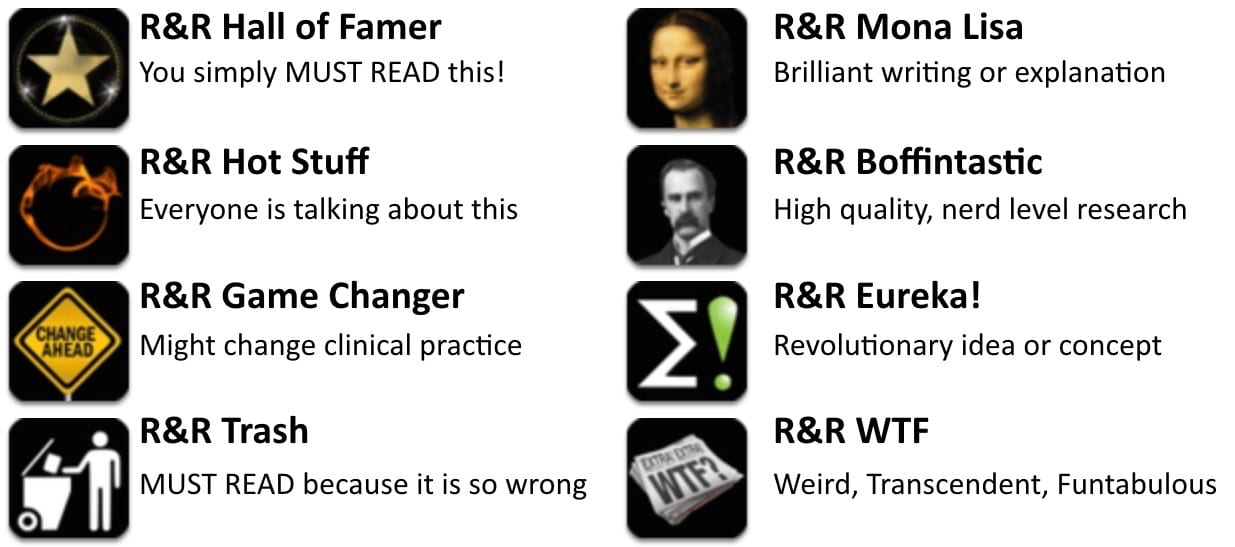R&R In The FASTLANE 109
Welcome to the 109th edition of Research and Reviews in the Fastlane. R&R in the Fastlane is a free resource that harnesses the power of social media to allow some of the best and brightest emergency medicine and critical care clinicians from all over the world tell us what they think is worth reading from the published literature.
This edition contains 6 recommended reads. The R&R Editorial Team includes Jeremy Fried, Nudrat Rashid, Soren Rudolph, Anand Swaminathan and, of course, Chris Nickson. Find more R&R in the Fastlane reviews in the : Overview; Archives and Contributors
This Edition’s R&R Hall of Famer
Fanaroff AC et al. Does This Patient With Chest Pain Have Acute Coronary Syndrome? The Rational Clinical Examination Systematic Review. JAMA 2015; 314(18):1955-65. PMID: 26547467
- Another great publication in the rational clinical exam series. This article synthesizes data from 58 publications to help guide clinicians in evaluating patients with chest pain for ACS. Overall, individual pieces of the history and physical don’t have the best test characteristics. Prior abnormal stress test (LR 3.1), peripheral arterial disease (LR 2.7) and pain radiating to both arms (LR 2.6) have the best, albeit weak, test characteristics. EKG findings were marginally better after exclusion of the obvious STEMI (ST segment depression LR 5.3, any ischemia LR 3.6). On the other hand, the HEART score performed quite well. For high-risk range HEART score (7-10) the + LR = 13 and for the low-risk range HEART score (0-3) the – LR = 0.20.
- Recommended by Anand Swaminathan
Aldous S, et al. The incremental value of stress testing in patients with acute chest pain beyond serial cardiac troponin testing. Emerg Med J 2015; PMID: 26511125
- Thousands ruled-out, hundreds stress tested – and only a handful of true positives and just as many false positives.
- Recommended by Ryan Radecki
- Further reading: What did we find on stress testing? (Emergency Medicine Literature of Note)
Raupach T et al. Moving Knowledge Acquisition From the Lecture Hall to the Student Home: A Prospective Intervention Study. J Med Internet Res 2015; 17(9): e223. PMID: 26416467
- The popularity of podcasts for medical education continues to rise but there’s little evaluative literature on the educational utility of this modality. This group sought to assess the impact of podcasts accompanied by a quiz vs lecture attendance on short and medium term knowledge retention and found that students in the podcast arm had better knowledge retention. This isn’t a perfect study but is a step towards improved evaluation of innovative learning modalities.
- Recommended by Anand Swaminathan
Kim WY et al. Factors Associated with the Occurrence of Cardiac Arrest after Emergency Tracheal Intubation in the Emergency Department. PLoS One 2014; 9(11). PMID: 25402500
- Resuscitate before you intubate has become the new mantra from the likes of Rich Levitan, Scott Weingart and others. This article is a case-control study of criticall ill adult patients requiring airway management in the ED. This group found that patients with a systolic blood pressure < 90 mm Hg had an OR = 3.67 for a peri-intubation cardiac arrest. RSI should no longer be thought of simply as “rapid” sequence intubation but as “resuscitation” sequence intubation.
- Recommended by Anand Swaminathan
Gates S et al. Mechanical chest compression for out of hospital cardiac arrest: Systematic review and meta-analysis. Resuscitation 2015. PMID: 26190673
- Five trials included (3 evaluated LUCAS or LUCAS-2 device & 2 evaluated the AutoPulse device). Evaluation of current studies DOES NOT suggest that mechanical chest compression devices are superior to manual chest compression, when used during resuscitation after out of hospital cardiac arrest.
- Recommended by Salim R. Rezaie
Matthys J, et al. Differences among international pharyngitis guidelines: not just academic. Ann Fam Med. 2007 PMID: 17893386
- I love this article, probably because it hits on two of my favorite soapbox topics: guidelines and antibiotics for sore throats. They searched for any major pharyngitis guidelines and found 10 from different countries and organizations. Two people individually coded each guidelines for all the major recommendations. The key finding of this paper is that despite all of these guidelines being “evidence based”, they arrive at wildly different recommendations. Several guidelines recommend prescribing antibiotics only if the patient is very sick or high-risk, but others suggest treating almost everyone. Not a single publication, including the Cochrane review, was cited by all the guidelines.
- Bottom line: Unfortunately, guidelines are rarely an adequate source of evidence based clinical information. (Also, for most parts of the world, pharyngitis probably doesn’t need antibiotics.)
- Recommended by Justin Morgenstern
Emergency physician with interest in education and knowledge translation. #FOAMed Fan | @jdfried |






